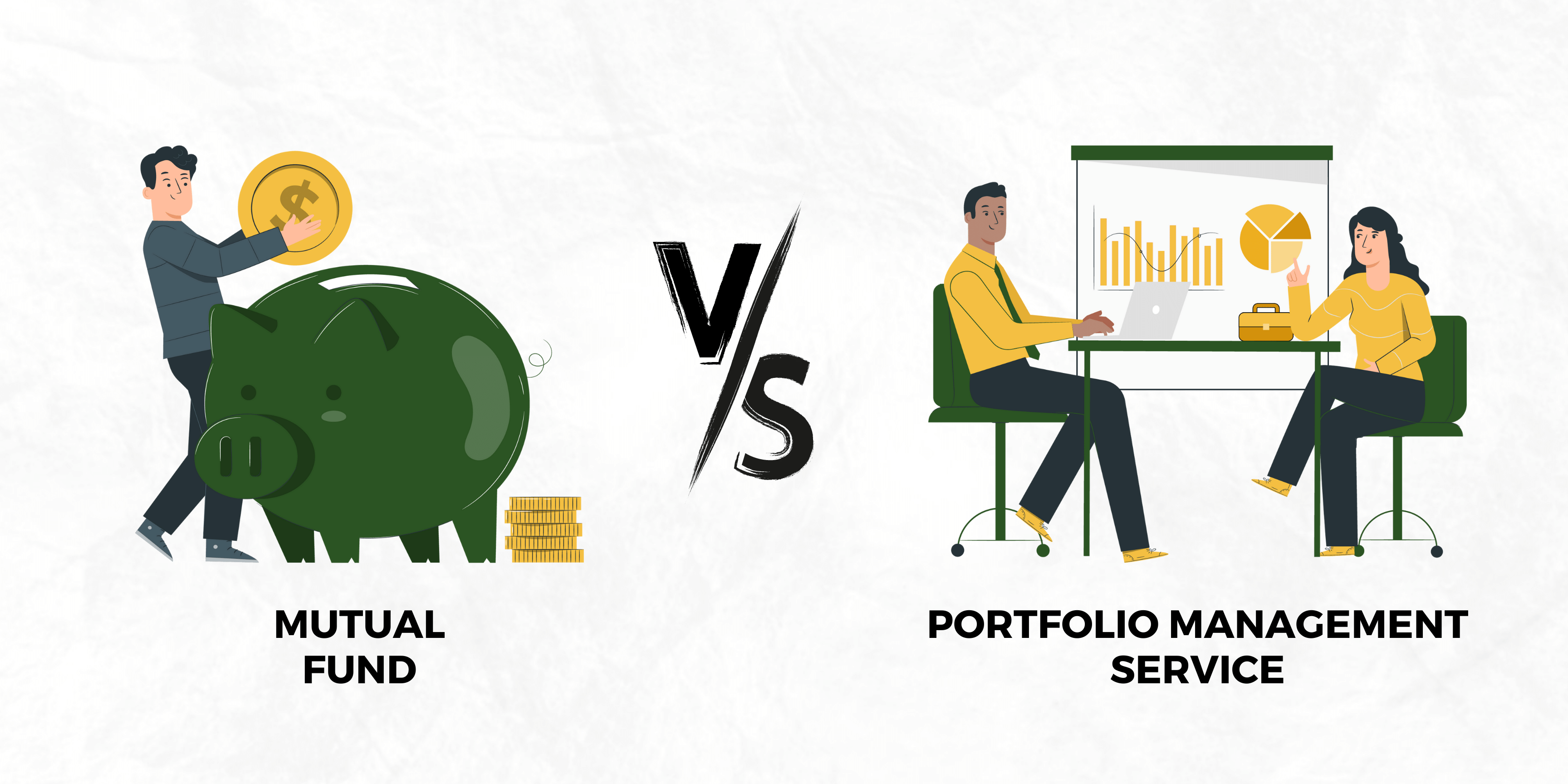PMS vs Mutual Fund: Understanding Portfolio Management Service
- 1 PMS vs Mutual Fund: A Comparative Analysis
- 1.1 Structure:
- 1.2 Ownership:
- 1.3 Customization:
- 1.4 Minimum Investment:
- 1.5 Management Fees:
- 2 What is a Portfolio Management Service?
- 3 What is a Mutual Fund?
- 4 Conclusion
- 4.1 FAQs:
- 4.1.1 Q: What is the main difference between Portfolio Management Services (PMS) and Mutual Funds?
- 4.1.2 Q: Which option is better for high-net-worth individuals seeking personalized investment strategies?
- 4.1.3 Q: Are there differences in the minimum investment requirements between PMS and Mutual Funds?
In Short:
- PMS offers customized investment strategies tailored to individual investor preferences and goals.
- Mutual funds pool investments from multiple investors and offer preset investment strategies and portfolios.
- PMS typically requires a higher minimum investment but gives investors greater control and flexibility over their portfolios than mutual funds.
When you are looking to invest your hard-earned funds, There are various options to consider. Two of the most popular options to create wealth can be found in Portfolio Management Services (PMS) and Mutual Funds. In this post, we’ll look at the main distinctions between these two investment vehicles and explore the details of what Portfolio Management Services and PMS vs Mutual Funds are about.
PMS vs Mutual Fund: A Comparative Analysis
Structure:
- Mutual Fund: Mutual funds pool funds from many investors to fund a diverse investment portfolio, including bonds, stocks, or other types of securities.
- Portfolio Management Service (PMS) is a customized investment service in which the portfolio manager oversees the individual’s investments in bonds, stocks, and other assets for them.
Ownership:
- Mutual Fund: Mutual funds are owned by investors who own parts of the fund with rights in proportion to the fund’s assets.
- PMS: PMS investors enjoy direct control over their securities, providing more power and flexibility.
Customization:
- Mutual Fund: Mutual funds have preset investment strategies and portfolios like all fund investors.
- PMS: PMS gives you the highest level of customization, allowing investors to personalize their portfolios to meet their individual risk and financial objectives.
Minimum Investment:
- Mutual Fund: Mutual funds usually come with lower minimum investment requirements, making them available to various investors.
- PMS: PMS typically requires an investment of a greater minimum and is often geared toward wealthy individuals.
Management Fees:
- Mutual Fund: Mutual funds have a management fee. This is a percentage of funds under management (AUM).
- PMS: PMS is an annual fee comprising fixed and performance-based charges, or both, based on the portfolio manager’s discretion.
| Feature | (PMS) | Mutual Fund |
|---|---|---|
| Structure | Customized investment service for individual portfolios | Pooled investment vehicle with preset strategies |
| Ownership | Direct ownership of securities in the portfolio | Ownership of shares in the mutual fund |
| Customization | High level of customization based on investor preferences | Preset investment strategies and portfolios |
| Minimum Investment | Typically requires a higher minimum investment | Lower minimum investment requirements |
| Management Fees | Annual fee based on portfolio manager’s discretion | Management fee as a percentage of assets under management |
| Control & Flexibility | Investors have more control and flexibility over their portfolio | Limited control and flexibility due to pooled structure |
What is a Portfolio Management Service?
So, let’s find out what is a portfolio management service. Portfolio Management Service is a personal investment service registered portfolio managers provide. It is designed to offer investors an individual investment strategy and portfolio administration.
This is what you need to be aware of about PMS:
- Personalized Methodology PMS is a solution that caters to the individual investor’s specific financial objectives, risk tolerance, and investment preferences. The portfolio manager develops an investment strategy that is customized to be in line with these goals.
- Direct Ownership investors in PMS are the sole owners of the securities they have in their portfolio, which allows them to exert greater control and transparency on their portfolios.
- Registered professional Management Portfolio managers bring their knowledge and expertise to the board. They manage the portfolio, making educated decisions about the allocation of assets and stock selection.
- Diversification portfolios of PMS are spread across different sectors, asset classes, and securities, reducing investing in a concentrated manner.
- Performance Reports: PMS provides investors with periodic performance reports and updates, assuring the transparency of their investments and keeping them accountable.
What is a Mutual Fund?
A mutual fund is a professionally managed investment vehicle that pools money from multiple investors to invest in a diversified portfolio of securities such as stocks, bonds, or other assets.
Here’s what you need to be aware of about mutual funds:
- Professionally Managed: Mutual funds are managed by professional fund managers who make investment decisions on behalf of the fund’s investors. These managers conduct research, analyze market trends, and allocate the fund’s assets to meet the fund’s objectives.
- Diversification: Mutual funds offer diversification by investing in various securities across different asset classes, industries, and regions. This diversification helps spread risk and reduce the impact of any single security’s performance on the overall portfolio.
- Liquidity: Mutual funds provide liquidity to investors, allowing them to buy or sell shares on any business day at the fund’s net asset value (NAV). This liquidity makes mutual funds an accessible investment option for individuals who want to access their funds easily when needed.
- Investment Options: Mutual funds offer various options for risk tolerances, investment objectives, and time horizons. Investors can choose from equity funds, bond funds, money market funds, index funds, and more based on their preferences and financial goals.
- Regulation: Mutual funds are regulated investment vehicles governed by regulatory bodies such as the Securities and Exchange Board of India (SEBI) in India or the Securities and Exchange Commission (SEC) in the United States. These regulations protect investors’ interests and ensure transparency and accountability in the mutual fund industry.
- Fees: Mutual funds charge fees and expenses to cover management costs, administrative expenses, and other operational charges. These fees typically include a management fee, a percentage of the fund’s assets under management (AUM), and other expenses like administrative fees, distribution fees, and operating expenses.
- Performance: The performance of a mutual fund is measured by its returns over a specific period, typically benchmarked against relevant market indices or peer funds. Investors should evaluate a fund’s past performance and other factors such as risk, expenses, and investment objectives before making investment decisions.
Conclusion
In conclusion, even though each of the Mutual Funds and Portfolio Management Services can be used to build wealth, PMS stands out as an individual and customized investment option. It is an excellent choice for investors who want more control, flexibility, and a more professional approach to managing their portfolios, especially high-net-worth investors with particular financial objectives. Knowing the difference between these two options will assist you in making an informed decision on the best place to put your money according to your requirements and preferences.
FAQs:
Q: What is the main difference between Portfolio Management Services (PMS) and Mutual Funds?
A: The main difference lies in their structure and customization. PMS offers personalized investment strategies tailored to individual preferences, while mutual funds pool investments from multiple investors with preset strategies.
Q: Which option is better for high-net-worth individuals seeking personalized investment strategies?
A: Portfolio Management Services (PMS) are often preferred by high-net-worth individuals due to their high level of customization and direct ownership of securities, providing more control and flexibility over their portfolios.
Q: Are there differences in the minimum investment requirements between PMS and Mutual Funds?
A: Yes, typically PMS requires a higher minimum investment compared to mutual funds. Mutual funds generally have lower minimum investment requirements, making them more accessible to a wider range of investors.

















